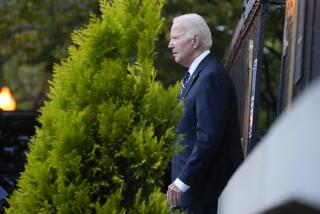Column: Interior Department says it’s investigating Bernhardt conflicts — days after he wins confirmation
- Share via
The Interior Department’s office of inspector general disclosed Monday that it has opened a formal investigation into alleged ethical conflicts by Interior Secretary David Bernhardt, a former lobbyist for natural resources industries who won Senate confirmation to his post just four days ago.
The disclosure came in separate letters, one to Democratic Sens. Elizabeth Warren of Massachusetts and Richard Blumenthal of Connecticut, and another to Ron Wyden of Oregon. All had called for the investigation.
In the letters, Deputy Inspector General Mary Kendall said her office had received seven complaints, including those from the Senators, “from a wide assortment of complainants.” She continued, “We are continuing to gather pertinent information about the complaints and have opened an investigation to address them.” She said the office would conduct the review “as expeditiously and thoroughly as practicable.”
We now have an Interior Secretary who has been on the job for one full business day and is already under investigation.
— Sen. Ron Wyden, D-Ore.
The inspector general’s action has the air of locking the barn door after the horse has escaped. Allegations that Bernhardt has been acting in his official capacity to advance the interests of his former clients have been rife since his appointment as Deputy Secretary in 2017; he was appointed acting secretary to replace former Secretary Ryan Zinke, who left office under an ethical cloud, in January.
Bernhardt was confirmed as secretary by the Senate on April 11, almost entirely along party lines, with all Republicans and three Democrats in support.
Wyden noted in a statement Monday that he earlier had called for Bernhardt’s confirmation to be delayed until the ethics allegations had been thoroughly investigated.
“We now have an Interior Secretary who has been on the job for one full business day and is already under investigation,” Wyden said in the emailed and tweeted statement. “With Bernhardt’s track record and the number of allegations against him, it’s no surprise.”
Added Warren, “It’s about time that the Department of the Interior opened an investigation into Secretary David Bernhardt’s conflicts of interest...He should have never been confirmed to lead the department with these outstanding ethics complaints.”
A spokeswoman for Bernhardt said Monday that he “is in complete compliance with his ethics agreement and all applicable laws, rules, and regulations.” The spokeswoman, Faith Vander Voort, observed that Interior’s ethics office already had cleared Bernhardt of many of the accusations.
“Secretary Bernhardt is hopeful the Inspector General will expeditiously complete a review of the facts associated with the questions,” which she attributed to “Democratic Members of Congress and DC political organizations.”
As my colleague Bettina Boxall and I reported earlier, Bernhardt has pursued policies and taken actions at Interior that would manifestly deliver direct benefits to former clients at the law form of Brownstein Hyatt Farber Schreck, which has represented companies in the oil, gas, mining and agriculture industries.
Among those clients is the giant Westlands Water District in California’s Central Valley. Bernhardt has played a role in reconsidering policies and biological assessments that have constrained water supplies to Westlands from the federal Central Valley Project (CVP). He also has agitated for changes in the Endangered Species Act, the basis for many biological findings limiting those water supplies.
Upon taking office as deputy in 2017, Bernhardt pledged to recuse himself for as long as two years, or until mid-August this year, on decisions involving 22 firms and individuals with which he had a former business connection. They included Westlands and the notorious Cadiz water project, a widely derided plan to drain water from under the Mojave Desert that has been opposed by numerous California state agencies but has mysteriously won the favor of the Trump administration.
Interior’s ethics officers, as we’ve reported, cleared Bernhardt of ethical conflicts related to Westlands by arguing that the policies and administrative rules in which he played a role involved issues broader than merely the delivery of water to Westlands and other CVP water customers. As a result, they could not technically be considered “particular matters” on which he was obligated to be recused.
Environmental law groups and the senators questioned that conclusion, noting that the decisions aided a “discrete and identifiable class” of beneficiaries — namely the CVP’s 270 water customers — and therefore should have been out of bounds for Bernhardt.
Keep up to date with Michael Hiltzik. Follow @hiltzikm on Twitter, see his Facebook page, or email [email protected].
Return to Michael Hiltzik’s blog.
More to Read
Sign up for Essential California
The most important California stories and recommendations in your inbox every morning.
You may occasionally receive promotional content from the Los Angeles Times.











